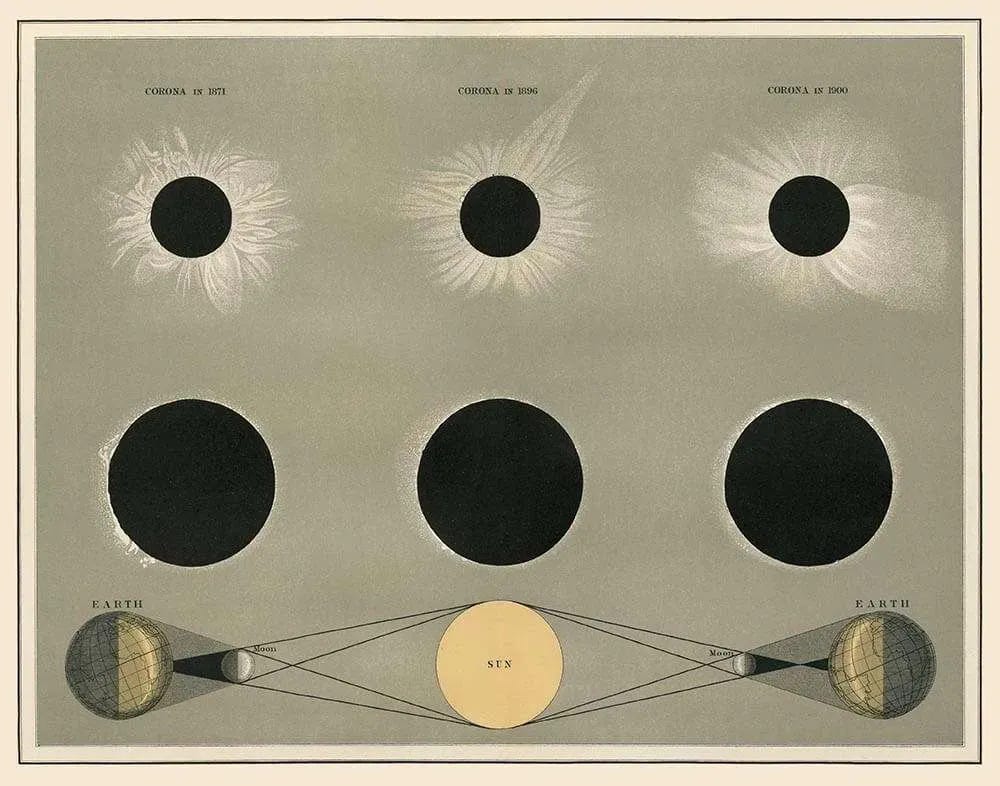In Pursuit of Totality
The black circle appeared in the sky. The edge of that circle was keener than a blade, its perfect symmetry austere. But from the fine edge of that white-red-gold ring delimiting the circle, striations of white light flared into the sky like fine shoots springing from a seed flung in the firmament casting about for a place to grow, or like the filaments of a sea creature open to the nourishment of the deep. My human eye recognized the shape of life in those rays.
Years ago Annie Dillard likened her experience of a total eclipse to that of marrying your beloved. I found her analogy to be apt. The whole experience felt like an affair of the heart. It began at 7:00 am the day before the eclipse. Rapid fire texts between multiple parties. A hurried and distracted phone call with several people simultaneously checking weather maps, eclipse calculators tallying the minutes of totality, and the availability of outrageously priced hotel rooms in places I’d never heard of. A sense of risk, the mild clench of the stomach fearing regret. And a desire that could have been either superstitious or mystical to fly away in the invisible dance of celestial bodies.
In less time than it takes for the moon to move across our view of the sun, my large family and I had packed our bags and begun our start-stopping journey up through I-35 traffic from south Texas to Heber Springs, Arkansas, population 6,964. As we drove, I wondered what we would encounter at the appointed hour the following day.
The day of the eclipse began slowly, like a lost planet that only loosely feels the pull of gravity. Children meandered and eddied around adults as we stood among the tables of the hotel breakfast buffet catching up and making plans. What to eat? Where exactly to go? And who was in charge anyway? But inevitably the disparate people who had come together cohered into a group.
We gathered with a joyous sense of celebration. Games, music, laughter, movement filled our morning. We caught the first glimpse of the moon encroaching upon the light of the sun through our mirrored eclipse glasses as we stood on the lawn east of our hotel. In a flurry we flung our camping chairs in the back of the van, counted up the children, and drove up a hill to an empty lot I had previously discovered by happenstance. It was perfect. Tall pine trees surrounded a large meadow, giving us an unimpeded view of the rolling Ozarks stretching out to the horizon. The children caught grasshoppers in the grass while we set up chairs and tarps. My brother played “Staring at the Sun” over his bluetooth speaker.
I thought the eclipse would happen gradually, like a sunset. And it did, at first. The air cooled, the light softened bit by bit. We looked around at each other, delighted. “It’s almost here!” But then the light began to change more quickly. It fell like an object falling through space. Like a parabolic descent, or a logarithmic curve, or the curve of light as it falls into a black hole. The day slipped from crickets to twilight to, silently, stars in the daytime sky. Venus appeared next to the sun, and then Jupiter not far off. And then the sun was gone. In its place hung a black circle that contained nearly all the light of the sky.
I laughed like a child. The moment left me breathless, caught up in a thrall of wonder. I felt joyous, ebullient. I looked at my beloved sun. In every day before this, I had seen and felt its effect on the world. In every day before this the sun blazed, warmed, burned, illuminated. The sun made things beautiful, but rarely was it beautiful. It was too much for beauty, or I was too small. But now, I looked up in awe. My sun was gorgeous. Though the streams of light emanating from the eclipse didn’t move to my eye, the unpredictable shape of them curved out in a delicate invitation from the sky. Come dance.
How strange to see something more clearly when it is hidden. This is the wisdom that the wise call foolishness. We see a shadow on our cave walls, and reach for the object that casts it. But here is something better, to be in a shadow and learn to see the light that gives shadow its sense.
I don’t believe I have ever had a moment of pure wonder, elation, and awe like I experienced during the minutes of totality. The only thing that feels close are my memories of the births of my children, when I first gazed upon a new child that was at once so familiar and so mysterious. To look into a baby’s eyes is not unlike peering through a telescope through an immense distance only to find that the light from that far-off place has already arrived at the eye. To gaze at an eclipse is not unlike discovering a new color of the rainbow. Common, pervasive, and totally invisible until suddenly it is not.
Would that I could pursue God in the same way I pursued the eclipse, would that I could be translated from a common world of afternoon sunshine to a dusky paradise where I can see God beckoning from behind a shadow, and dance.
Rachel Jardine is an Associate Editor at Wayfare. She mothers her children in San Antonio, Texas, and practices law.




